BarCampSaigon Winter 2011 was a success by most measures, comparable to the previous one. There were a lot of registrations, a lot of attendees, and a lot of sessions. We fed, clothed, and caffeinated hundreds of people and found sponsors willing to pay for it all. We didn't lose money (making money isn't possible, but losing money is). Yet something about it has been bothering me since last Sunday.
Barcamping is easy; Easy to attend; Even easy to organize.
Yes, it can be easy to organize a BarCamp. But, I think, it's really difficult to organize BarCamps (plural).
For one, most people who like the idea of organizing a BarCamp like the idea exactly once. It's hard to keep the fire going. The first BarCamp Saigon flame nearly died out - some embers turned into a second generation. But BarCamp Hanoi's flame has already disappeared. These are unrecognized failures.
The problem, as I see it, is that this BarCamp didn't necessarily ensure that another BarCamp would happen, and I think just continued to fuel the myth among people that BarCamps will happen magically and automatically, that they will get a free meal and t-shirt again. After some thought, these three distillations occurred to me:
1. barcamp should beget barcamp.
2. barcamp should be the beginning - not the end.
3. barcamp should be the exception - not the rule.
So let me explain.
1. BarCampSaigon should be the genesis of the next BarCampSaigon, and also BarCamps in other Vietnamese cities - BarCampCanTho, BarCampDaNang, BarCampDaLat. People should understand what a BarCamp is enough to organize simple ones in their hometowns, and do it without worrying about significant funding or caring how many people will show up. Clothing and caffeination optional.
2. Things should start at BarCamp. Ideas should be formed and relationships forged out of discussions among people who should have been meeting more regularly but hadn't. It shouldn't be a place to launch or announce your finished product, although if you started from a previous BarCamp that would be thrilling news. Sessions should not just lead to greater understanding, but cause new questions and avenues of inquiry to be developed.
3. BarCamp is the unconference. But it's also become the premier tech conference in Saigon. I think there should be large tech conferences here covering the major topics that are presented on at BarCampSaigon. And BarCampSaigon should be the place for importing new foreign and emerging ideas, which should then one day get full conferences of their own, so that BCSG can be a platform for further more ideas which need sharing.
These three goals aren't officially BarCamp's raison d'etre, nor are they the only important ingredients in a BarCamp. The meat of the camp does matter: the number and quality of sessions and people leading them so that people buzz about the next BarCamp; food and coffee and beer to get people to sit down communally; design of t-shirts and other assets to make the event come off professional; and convincing sponsors to make it all happen. I would like to have more thoughts about how those ingredients can coincide with the above three ideas.
UPDATE: Startup Weekend Ho Chi Minh City 2012 is happening this weekend, starting tonight (Friday September 14) and commencing on Sunday the 16th. The "hacking" venue is The START Center For Entrepreneurs on Nguyen Thi Minh Khai, and final presentations and judging will be at Intercontinental Hotel. This year again I'll be a coach/mentor for the aspiring young entrepreneurs.
--
If you missed it, a few weeks ago the global Startup Weekend competition came to Ho Chi Minh City (which we all know is Saigon). There have been a number of such startup idea pitching competitions in both Saigon and Hanoi recently. I was able to take part in StartupWeekend here in the capacity of a mentor. This meant I could walk around to each team while they were working on their ideas and give suggestions. Suggestions were not so much about the core idea, which was already set, or how to legally incorporate, which was too early, but how to strengthen the business case for the idea, improve implementation, create a better presentation (presentation is seriously important), and suggest alternative markets and competitors which they may not have been aware of.
The event takes place over 54 hours (a weekend starting from Friday night) in which first ideas are pitched, then filtered into the most popular ones. In the end there were about a dozen ideas which the initiators could then gather team members from those whose ideas weren't chosen or came just to join a team.
In the end, these teams gave presentations before a live audience (including representatives from the media). I didn't see much coverage of the actual pitches of the event so I'd like to record them here.
Read the rest of this article...This post comes out of a conversation I had with my friend Prithvi, who has years of experience in the outsourcing industry both here and in China and other countries.
Outsourcing is a huge industry here in Vietnam. It solves several problems for Vietnam. First, it brings in much needed income. Second, it does so without requiring a high ratio of expensive imported inputs (compare this to making shoes which are exported for a cheap price, but most of the costs come from materials which must be imported). Third, it helps advance domestic use of technology, which should make all industries more efficient.
Read the rest of this article...This past weekend was the third annual Saigon MobileDevCamp held at Bach Khoa University. Although I'm mainly a web developer, as the event was billed as a brother to BarCamp, I decided to go and check it out, meet some people, support my friend Dan, and see if anything from the event could be applied to the upcoming BarCamp Saigon on December 11th.
Like BarCamp, the venue is a local university. However, the quality of facilities between a regular Vietnamese university like Bach Khoa and a foreign-operated campus like RMIT are on a quite different level. Most rooms were without air conditioning and became quite hotter than I'm accustomed to. In the morning there were a number of sessions on developing mobile apps (I checked out a session on PhoneGap but missed the Unity 3D session). In contrast to the BarCamp ideal, guest speakers were invited to give sessions which were planned and scheduled beforehand. Topics were confined to the "mobile development" theme.
After lunch, the main event would be a 24-hour coding competition. As I was already waking up far earlier than usual to attend the conference which I hadn't even properly registered for, I had no intention of joining the hackathon but I would eventually be overcome by my friend Cong's excitement for Doing Things.
So that's it. We lost. We learned some lessons.
1. Be one of the first to present if you can.
2. Don't single out and alienate judges.
3. Don't build clean, well-architected software with maintainable code. In real life, this matters. For this competition, it doesn't.
The greatest tragedy perhaps (besides not winning) was that the presentations were all made in private with the judges. Having groups present their apps for everyone to see, or at least putting them somewhere online, would have been the BarCamp way. As we didn't receive any feedback or anything from the judges, it would have been nice to share what we all worked on for 24 hours (multiplied by nearly 100 people) and be able to learn from others' experience. Even if there wasn't time for all to present, I don't think I was the only one interested in seeing at least the demos from the winners.
- tomo's blog
- Login to post comments
- Comments
Having just gone back to the United States for a week, here are some reasons why I no longer live ther. I didn't move abroad because of these reasons, but now that I'm living in Vietnam, these are some of the reasons why I won't move back.
1. Lawn-mowing. I'm allergic to not only the job of mowing lawns and the grass clippings and plant matter that gets tossed into the air, but now the sound itself puts me on edge. Somehow all the dust in the air and sound of motorbikes in Saigon doesn't have the same effect.
Read the rest of this article...I have turned the Correct Horse Battery Staple post's Foreign Language Random Password/Passphrase Generator into a Google Chrome extension.
Here is what it looks like:
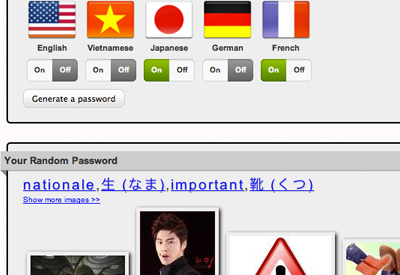
And in the Chrome web store:
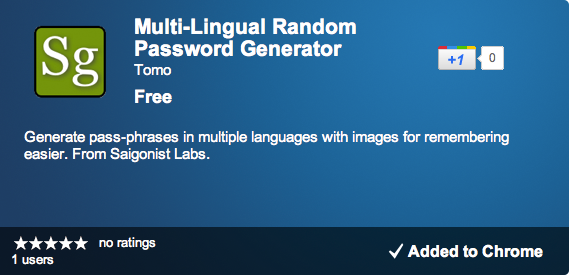
Go install it and easily generate a secure and memorable passphrase anytime you need it!
- tomo's blog
- Login to post comments
- Comments
If you read much English-language Vietnamese news online, you'll often read this conclusion and chuckle silently: "Police are investigating."
These are crime stories and you may imagine to yourself that police are investigating, how they're looking for clues (cue CSI: Saigon), and at what point they conclude their investigation conclusively. (There are far fewer followups in the papers.)
There's a new Tumblr about this phenomena of police investigating things. A sample:
[Sorry, the link went down.]
Police are investigating all sorts of claims. Even children's arithmetic puzzles.
Seriously, every quote from the police: "we are investigating". Here is a bunch of random samples from recent news articles at Tuoi Tre:
Read the rest of this article...Inspired by XKCD, this is a password generator for those of you who know English and Vietnamese or another language. Once a random set of words in your languages has been generated, images for those words will be shown to help you visually remember your new password. If the random password seems too hard to remember, you can always spin the wheel a second time!
Each time you click, 4 random words from the selected languages will be loaded. I chose the number 4 so as to not overload Google Image search, so you may want to run it twice to get 5 or more words for added security. I find that the images help to visually remember the password.
If you still want a password like "!Agt:m%p>" then it's also an option below.
Your Random Password
The other day there was an XKCD strip about password security. The idea is that we've been trained over the years to use passwords like 'Tr0ub4dor&3' because they mix upper and lower case, use numbers, and special characters. But a password like that is based on a common English word using a common substitution pattern (l33tsp34k) of letters for numbers and is much easier for a hacker to guess than four random words like 'correct horse battery staple', which is longer but much easier to remember.
A good password should be random. Humans aren't random and 'Tr0ub4dor' looks random enough but it isn't. Even translating the word into a foreign language is by itself weak. Generally, if you come up with the password yourself then it's not anything close to random.
Plenty of software exists to come up with passwords made up of random characters. The problem is that these passwords weren't meant to be memorized. Writing your password down somewhere sort of defeats the purpose.
So four random English words makes a pretty good password, but is still hard to remember if they are obscure and unfamiliar words. Out of the over one hundred thousand words in an English dictionary a few thousand are commonly used.
So a few thousand English words are generally useful. But those of us who are bilingual can basically double the size of the vocabulary used! This foreign language random password generator seeks to take advantage of that numerical weapon, and with a large number of possible languages (and even more language combinations), even if a hacker got an encrypted password file it would be as hard to crack as a random 9-character totally impossible to remember string.
You can increase the security of your password further by using a "salt" random string (non-dictionary word) that you remember and always use with your passwords, and by adding punctuation in one of the words.
UPDATE: There is now a Chrome extension that makes creating passwords on the fly really fast and easy! Check out the Correct Horse Battery Staple Google Chrome Extension
- tomo's blog
- Login to post comments
- Comments
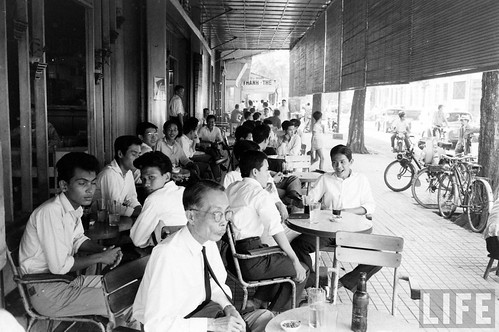
Looking at photographs of pre-1975 Saigon always make me wonder how differently things could have turned out had South Vietnam and North Vietnam remained separate countries. Would South Vietnam be as developed, modern, and affluent as South Korea is today compared to the starving citizen-prisoners of the Hermit Kingdom? If you've seen old photos of both Hanoi and Saigon you'll notice that even then Saigon was much more modern, cosmopolitan, and affluent compared to Hanoi.
In some ways, today we haven't really changed all that much since 1975, if you ignore the forward and backwards steps in the two decades after the war ended. The streets are still recognizable, mostly they've just changed names. Freedom has been replaced with Revolution. The black and white renditions of wooden cafe seats are even nicer than the red or blue plastic chairs I'm often in today.
Anyways, I've been looking over the 245 photos of 1961-era Saigon scanned in from Life magazine all weekend. I hope you enjoy as much as I did, even if loading them takes awhile.
A map shows the train used to terminate at Ben Thanh market. Saigon had grade-separated highways back in 1961.

Saigon.
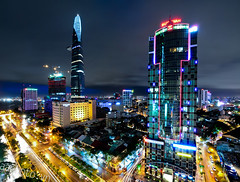
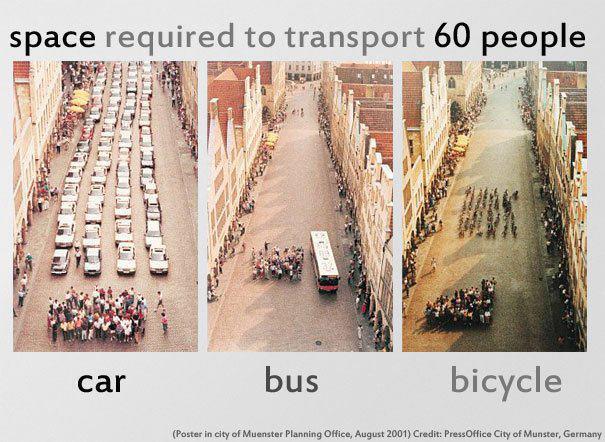
Recent comments
1 year 11 weeks ago
2 years 3 days ago
2 years 1 week ago
2 years 3 weeks ago
2 years 19 weeks ago
2 years 19 weeks ago
2 years 19 weeks ago
2 years 19 weeks ago
2 years 19 weeks ago
2 years 19 weeks ago